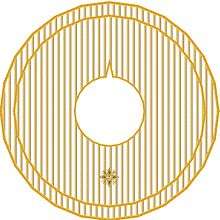Fanon
Fanon may refer to:

Papal fanon
The fanon (old Germanic for cloth) is a vestment that around the 10th or 12th century became reserved for the Pope alone and for use only during a pontifical Mass.
Description and use
It consists of a doubled shoulder-cape (somewhat like a mozzetta) of white silk ornamented with narrow woven golden stripes, so that the colors alternate white and gold. The first layer of the fanon is placed under the stole and the second over the chasuble, under the white pallium. The two pieces of the fanon are nearly circular in shape but somewhat unequal in size and the smaller is laid over and fastened to the larger one. To allow the head to pass through, there is a round opening in the middle with a vertical slit running down the neckline at the back. The front part of the fanon is ornamented with a small cross embroidered in gold.
The fanon is similar to an amice; it is, however, put on not under the alb, but above it. Previously, the pope wore it only when celebrating a solemn pontifical Mass, that is, only when all the pontifical vestments were used. The manner of putting on the fanon recalled the method of assuming the amice universal in the Middle Ages and that continued to be observed by some of the older religious orders. After the deacon vests the pope with the usual amice, alb, the cingulum and sub-cinctorium, and the pectoral cross, he places the fanon on the pope by means of the opening (with the embroidered cross in front), and then pulls the back half of the upper piece over the pope's head. Then he vests the pope with the stole, tunicle, dalmatic, and chasuble, after which he turns down that part of the fanon which had been placed over the head of the pope, draws the front half of the upper piece up from under the chasuble, and finally arranges the whole upper piece of the fanon so that it covers the shoulders of the pope like a collar. The pallium is placed over the fanon.
Canon (fiction)
In fiction, canon is the material accepted as officially part of the story in an individual universe of that story. It is often contrasted with, or used as the basis for, works of fan fiction. The alternative terms mythology, timeline, and continuity are often used, with the former being especially to refer to a richly detailed fictional canon requiring a large degree of suspension of disbelief (e.g. an entire imaginary world and history), while the latter two typically refer to a single arc where all events are directly connected chronologically.
Origin
The use of the word "canon" in reference to a set of texts derives from Biblical canon, the set of books regarded as scripture, as contrasted with non-canonical Apocrypha. The term was first used by analogy in the context of fiction to refer to the Sherlock Holmes stories and novels, written by Sir Arthur Conan Doyle. Ronald Knox used the term in a 1911 essay "Studies in the Literature of Sherlock Holmes" to distinguish Doyle's works from subsequent pastiches by other authors. It has subsequently been applied to many media franchises. Among these are science fiction and fantasy franchises such as Star Trek, Star Wars, Harry Potter, Halo, Fallout, The Elder Scrolls, Mass Effect, BioShock, Doctor Who, Middle-earth, A Song of Ice and Fire, the Narnia series, the The Dark Tower books, and Dinotopia, in which many stories have been told in different media, some of which may contradict or appear to contradict each other.
Podcasts:

-
by Chicago
-
by Andres Calamaro
-
by Zoe
-
by Martha Wainwright
-
by Jodeci
-
by Receiving End Of Sirens
-
by Arashi
-
by Alegrijes y rebujos
-
by Michael Nesmith
-
by upa dance
-
by Limão Com Mel
-
by Jorge Drexler
-
by Chicago Soundtrack
-
by Chicago The Musical
-
by El Mastuerzo
-
by Twiinciity
-
by Lena
-
by Libra
-
by Orange Caramel
-
by Wide Mouth Mason
-
by Von
-
by Renee Zellweger
-
by Chief Keef
-
by Black Anvil
-
by Grupo Limite
Funny Honey
by: ChicagoRoxie.
Sometimes I'm right
Sometimes I'm wrong
But he doesn't care
He'll string along
He loves me so
That funny honey of mine
Sometimes I'm down
Sometimes I'm up
But he follows 'round
Like some droopy-eyed pup
He loves me so
That funny honey of mine
He ain't no sheik
That's no great physique
Lord knows, he ain't got the smarts
But look at that soul
I tell you that whole
Is a whole lot greater
Than the sum of his parts
And if you knew him like me
I know you'd agree
What if the world
Slandered my name?
Why, he'd be right there
Taking the blame
He loves me so
And it all suits me fine
That funny, sunny, honey
Hubby of mine!
(dialog)
He loves me so
That funny honey of mine!
(dialog)
He loves me so
That funny honey , of mine!!
(dialog)
Lord knows
He ain't got the smarts
(dialog)
Now he's shot of his trap
I can't stand that
Look at him go
rattin' on me
With just one more
Brain
What a half-wit
He'd be
If they string me
I'll know who
Brought the
Twine
That scummy,
Crummy
Dummy hubby of
